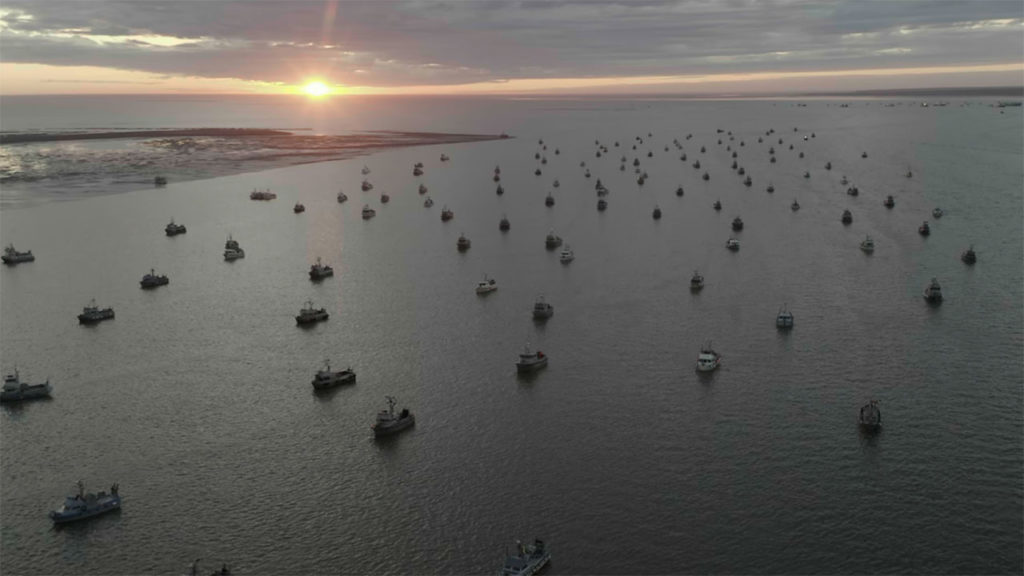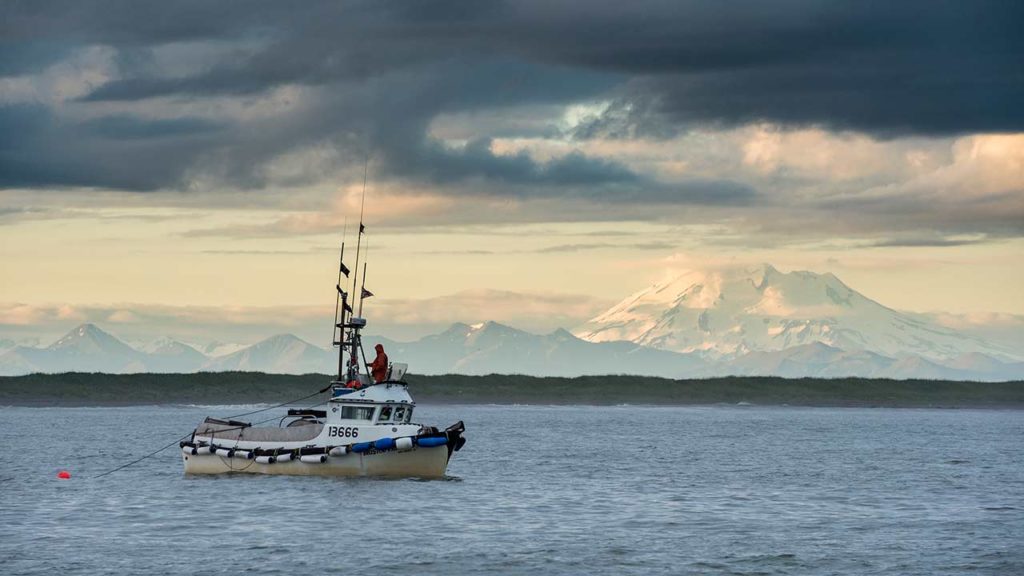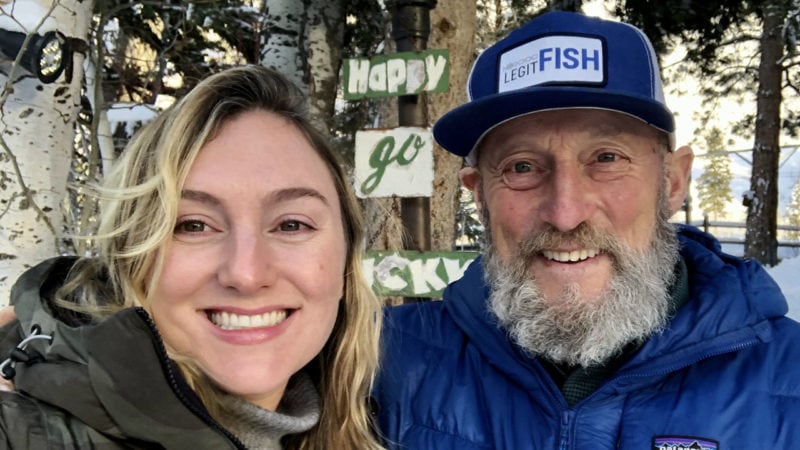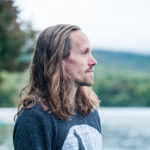Last Updated on September 7, 2022
Meghan Luck’s story has two common threads: Food and the wilderness.
Meghan, the Vice President of Alaska Wild Caught Seafood, is an inspiring force. Her ambition is uniquely tied to her passions and her mission to make others understand the relationship between food and the natural world that surrounds us.
She fondly recalls a day when she was five, harvesting wild blueberries in Alaska and arriving home with her mouth stained blue, and her hands and arms painted purple up to her elbows. There are the moments eating fresh-caught salmon off the back deck of her father’s boat. There was also wading in too-big boots at low tide to collect mussels—and later cooking them over an open fire. When her family went to Idaho for the winters when the Alaskan fisheries closed, she would help her father skin deer in the garage.
“It was less learning how to cook,” she says, “It was more figuring out how you can be connected to your environment, and how food, in some circumstances, can be all around us. It can be a symbiotic relationship.”
When we caught up, Meghan was in Ketchum, Idaho, the place that served as her childhood winter home and is now the home base of Alaska Wild Caught Seafood, the company she runs with her father. She has a generous smile, an unhurried, deliberate way of talking, and easy, grounded confidence. As we talk, the source of that confidence—and the drive behind the norm-breaking work she’s doing in the seafood sector—comes into focus.
Food has always been central in her family—the “nucleus of familial existence,” as she puts it—and at the heart of it all is salmon. Meghan’s father Matt Luck has fished for sockeye for decades, and like many fishing families, his livelihood revolved around Alaska’s finest fishery—Bristol Bay.

The Bristol Bay Way
Bristol Bay—located 450 miles from Anchorage in the Bering Sea—is one of the most productive fisheries in the world. It accounts for almost 50% of the global abundance of salmon.
With the growing worldwide demand for seafood, overfishing is a very real, immediate danger. Despite these worrying trends, Bristol Bay’s marine life is thriving, and in many cases, population numbers are not diminishing but growing. This is no accident.
“Bristol Bay has had a renaissance in how it is managed,” Meghan tells me. “The communities that surround it and the multi-generational fishermen that harvest out of that fishery rely on it for their livelihood. They want to keep [fishing] for as long as possible, and that requires protecting the resource.”
Sustaining this marine ecosystem is a continuous, cooperative effort between fishermen, scientists, researchers, and the government. Only 1,300 boats are granted permits to fish in the bay, and all of them are family-run, independent vessels. Additional protection comes in the form of escapement goals, which is a requirement that every year a certain number of fish need to get back to their natal river system to spawn.
The Bristol Bay fleet is only allowed to harvest the surplus. During a short six-week window every summer, biologists from the Alaska Department of Fish and Game monitor each river system daily to make sure the forecasted run is on track. If at any point an escapement goal is not met, the fishery is immediately closed, and fishing is prohibited. When the goal is reached, there’s an opener—a limited time window that fishing is legal.
Meghan describes the effect this has on fishing. “If there’s an opener for seven hours, you fish for seven hours. If it’s for 24 hours, you fish for 24 hours. Any human needs you have are set aside because the fish are there.”
Food and The Urban Wild
After a childhood living on boats and picking fish as a family activity, Meghan worked her first full season as a crew member on her father’s boat when she was 18-years-old. As a fledgling deck hand—known as a greenhorn—she was given some of the less glamorous tasks. “I’m bent over on the back deck with a razor blade attached to the end of a 2×4, making sure that every single gill of every fish that we catch is broken to protect the fish from bruising and ensure the highest quality meat as soon as it comes aboard.”
“There were weeks when we were working 22-hour days, non-stop,” she adds.
The memory, however, seems to make her cheerful, even nostalgic. “Those were some of the best times of my life, on the back deck, being ordered around by my dad. It felt incredibly powerful to be able to do those things both physically and mentally, and I remember after that thinking, ‘I can do anything.’”
The grueling work on a fishing boat set her up for her next adventure—New York City. Meghan stepped into the world of ad agencies and strategy consulting, where she developed a fundamental understanding of business, marketing, and the nuances of corporate leadership. At first glance, the worlds of Bristol Bay and the Big Apple could not appear more different. To Meghan, though, they share a common theme; they are both wildernesses.
“The wilderness for me has always been about pursuing some sort of curiosity. I think about low tide in Alaska, and how all of these animals come out, and all these weird smells happen. I would crawl through low tide and find all these creatures, and the woods were this expansive wilderness that held so much mystery,” Meghan says. “New York in my mind is almost the same thing, but with humanity. It was a different place to exercise all of that curiosity that had been bred from growing up outside.”
Meghan explored urban life and loved it. That exposure to a different environment brought with it a stark realization; the childhood she always viewed as normal was anything but.
“I never questioned where my food came from because I knew where it came from. I was the one who had helped to harvest it. The childhood that I had, and the cycles and rhythms of it that were supported by the land and the environment and those really precious resources were so easy for me.” Her easy energy grows serious. “I feel really privileged to have had that experience. It was so simple for me, but it’s not easy for everyone. There are food deserts everywhere. There are people who have no idea where their protein comes from.”

Back on the Bay
It was a yearning to share her experiences of food in the wild with others that ultimately brought her back home. After a decade in New York, she returned to Idaho and joined her father in their new venture—Alaska Wild Caught Seafood.
The two are a perfect pair. Matt has a lifetime of experience as well as deep knowledge and connection to the fisheries. Meghan brings the business background, and the drive to use sustainable seafood—and the stories behind it—to reshape the food narrative.
That narrative is about so much more than delicious food. By sharing where the food comes from, how the resource is sustained, and telling the stories of the people behind it all, Meghan is connecting consumers directly to the wild. “My mission in this business is to make that connection to food just as easy for as many people as possible.”
“Being able to supply people like ButcherBox with this kind of protein, while also helping tell the stories behind it, and connect the people who have it on their plate to the people who are pulling it out of a net is just crazy to me,” she says.
As she describes her mission, something reminds me of the memories of food and the wild she shared earlier in our chat. The raw, untamed joy that arose when talking about picking fresh blueberries or searching for mussels is palpable.
But she wants to share that passion on a wider scale. Through sourcing, sustaining, and telling stories about the world she’s so intimately connected to, she’s bringing us all closer, little by little, to the natural world we so desperately depend on.



